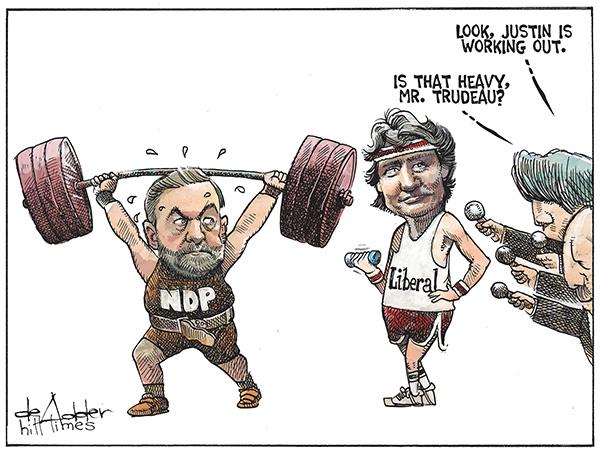Tories, Liberals face political peril in exploding Senate scandal
David Akin
OTTAWA - For most Canadians, if there’s just one bit of Parliament Hill news they’ve heard about in the last year, it would be Mike Duffy and the Senate expense scandal.
Well, next week, Canadians are about to hear a lot more about both of those things, all of which could be bad news for Prime Minister Stephen Harper and the Conservatives and, to a lesser degree, for Justin Trudeau and the federal Liberals.
On Monday, Duffy’s trial on 31 counts of fraud, breach of trust and bribery continues continues after a three-week break. It is not going to end anytime soon. In fact, when a group of reporters asked one of the prosecutors a few weeks ago if this trial could run until Christmas, the response was “which Christmas?”
So far, there haven’t been any major political bombshells, just a lot of back-and-forth between the defence and the prosecution to set the ground rules and the context for the charges.
From a political standpoint, the big witness will be Nigel Wright, who was fired from his job as Harper’s chief of staff after he tried to make the Duffy problem go away by cutting a cheque worth $90,000 from his own personal account to Duffy which Duffy was apparently to use to re-pay the Senate for expense claims he received which, if they were not illegal, certainly defied political common sense.
When all of this news about Duffy and Wright broke in 2013, the group that seemed most angry about all of it was — grassroots Conservatives! These were the folks who had been sending in $20 a month to a party that they believed stood for cleaning things up in government. And now, here was evidence that the party they’d been sending their money to was no better than those darned Liberals. Many stopped sending those cheques.
But that was 2013. And I believe that while the Conservatives suffered political fallout from the Duffy/Wright revelations in 2013, Duffy’s long trial - by itself — would be unlikely to be a significant factor at the ballot box this fall. A lot of those Conservatives, more worried about the prospects of Trudeau becoming prime minister than the ethics of the Duffy scandal, have resumed their political donations.
But Duffy appears to be just the first of what could be many senators in trouble. In August, the trial of former Liberal senator Mac Harb, on charges of breach of trust and fraud, begins.
Former Conservative senators Patrick Brazeau and Pamela Wallin are already under investigation by the RCMP for expense abuses.
And in week ahead, Auditor General Michael Ferguson will finger as many as 10 more senators as candidates for an RCMP investigation.
Ferguson has spent a colossal sum — $21 million! — to have an army of auditors comb through every travel, food, and housing claim made by just about any senator who sat in the red chamber from April 1, 2011 to March 31, 2013. If you’re a fan of the Senate — and most Canadians are not — his findings will not be pretty.
And so, by the end of the week, Canadians will have one senator — Duffy — already in front of a judge, another former senator about to go on trial, active RCMP investigations into two other senators and a pile of new allegations against another 10.
This is the point at which, I suspect, Canadians throw up their hands and conclude that we need a change in Ottawa. Any change.
That, to a large degree, is what Albertans recently concluded. It was a rot of a different kind in Alberta than we see in the Senate of Canada but it was a rot that a poorly run campaign by the incumbent Progressive Conservatives could not overcome. And Albertans chose change. And the agent of change happened to be Rachel Notley and the Alberta New Democrats.
The Senate scandal now involves and will likely involve politicians who sat in Harper’s caucus and some who sat in the caucus of Justin Trudeau and other Liberal leaders. None have ever sat in Thomas Mulcair’s NDP caucus.
If Canadians are disgusted by what they will see in the Senate expense scandal next week, expect Mulcair to be loudly and often making the case that he, like Notley, can be Canada’s agent of change.










